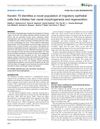 60 citations,
November 2013 in “Development”
60 citations,
November 2013 in “Development” Keratin 79 marks a new group of cells that are key for creating and repairing the hair follicle's structure.
 51 citations,
January 2007 in “Animal Genetics”
51 citations,
January 2007 in “Animal Genetics” The gene for slick hair in Senepol cattle is located on chromosome 20 and may involve the SRD5A2 gene.
 42 citations,
January 2019 in “Frontiers in Immunology”
42 citations,
January 2019 in “Frontiers in Immunology” A blood pressure drug, diltiazem, may also help treat influenza.
 19 citations,
May 2006 in “Clinical and Experimental Dermatology”
19 citations,
May 2006 in “Clinical and Experimental Dermatology” Researchers found a new mutation causing total hair loss from birth.
 10 citations,
January 2010 in “Veterinary pathology”
10 citations,
January 2010 in “Veterinary pathology” A new mutation in the hairless gene causes hair loss and skin wrinkling in mice.
 9 citations,
March 2018 in “European journal of dermatology/EJD. European journal of dermatology”
9 citations,
March 2018 in “European journal of dermatology/EJD. European journal of dermatology” A new mutation in the ST14 gene causes a rare skin and hair disorder in a specific family.
 8 citations,
January 2012 in “JIMD reports”
8 citations,
January 2012 in “JIMD reports” A new mutation in the AGPAT2 gene causes severe fat tissue loss and related health issues by reducing the protein's levels.
 1 citations,
August 2018 in “bioRxiv (Cold Spring Harbor Laboratory)”
1 citations,
August 2018 in “bioRxiv (Cold Spring Harbor Laboratory)” A new mutation in the TMEM173 gene and a risk allele in IFIH1 cause a unique set of immune-related symptoms.
 April 2017 in “Journal of Investigative Dermatology”
April 2017 in “Journal of Investigative Dermatology” Found new possible treatments for hair loss.
 72 citations,
January 2011 in “Current Pharmaceutical Design”
72 citations,
January 2011 in “Current Pharmaceutical Design” S5αR inhibitors might help treat schizophrenia and other mental disorders but need more research.
 58 citations,
June 2018 in “Scientific reports”
58 citations,
June 2018 in “Scientific reports” Researchers found 15 new genetic links to skin traits in Japanese women.
 36 citations,
October 2000 in “British Journal of Dermatology”
36 citations,
October 2000 in “British Journal of Dermatology” A different gene near the hairless gene on chromosome 8p21 causes a rare hair loss condition in a German family.
 33 citations,
September 2017 in “Journal of clinical immunology”
33 citations,
September 2017 in “Journal of clinical immunology” New treatments for immune disorders caused by FOXN1 deficiency are promising.
 1 citations,
May 2006 in “Expert Opinion on Therapeutic Patents”
1 citations,
May 2006 in “Expert Opinion on Therapeutic Patents” No FDA-approved treatments for chemotherapy-induced hair loss existed in 2006; more research was needed.
 November 2022 in “Gigascience”
November 2022 in “Gigascience” A specific genetic deletion in goats affects cashmere yield and thickness.
 82 citations,
March 2016 in “Autoimmunity reviews”
82 citations,
March 2016 in “Autoimmunity reviews” Animal models have helped understand hair loss from alopecia areata and find new treatments.
 13 citations,
March 2017 in “Genomics”
13 citations,
March 2017 in “Genomics” Genomic approach finds new possible treatments for hair loss.
 11 citations,
May 2021 in “Journal of Medical Virology”
11 citations,
May 2021 in “Journal of Medical Virology” Men are more likely to have severe respiratory viral infections like COVID-19 due to hormonal and genetic differences, while women generally have stronger immune responses.
 7 citations,
March 2017 in “Medical Hypotheses”
7 citations,
March 2017 in “Medical Hypotheses” Aquaporins could be new drug targets for treating polycystic ovary syndrome.
 36 citations,
September 2009 in “Journal of Cellular and Molecular Medicine”
36 citations,
September 2009 in “Journal of Cellular and Molecular Medicine” New treatments targeting skin stem cells show promise for skin repair, anti-aging, and cancer therapy.
 3 citations,
April 2021 in “Journal of Medicinal Chemistry”
3 citations,
April 2021 in “Journal of Medicinal Chemistry” Finasteride may affect PNMT, causing side effects.
21 citations,
June 2009 in “Mammalian genome” A new mutation in the Hr gene causes hair loss in mice, similar to a human hair disorder.
January 2012 in “Faculty of Health; Institute of Health and Biomedical Innovation” 26 citations,
October 2002 in “Journal of Investigative Dermatology” A specific gene mutation causes congenital hair loss.
6 citations,
June 2012 in “PloS one” A new mRNA variant of the SCF gene in sheep skin produces a shorter, different protein.
22 citations,
September 2014 in “JAMA dermatology” Ichthyosis with confetti is a genetic skin disorder with consistent ectodermal malformations and various KRT10 gene mutations.
18 citations,
January 2013 in “PLoS ONE” HLA-DRB5 and other genes may be linked to alopecia universalis.
 September 2024 in “Frontiers in Genetics”
September 2024 in “Frontiers in Genetics” A specific genetic marker is linked to male pattern baldness in Han Chinese men.
 August 2020 in “Pakistan Journal of Zoology”
August 2020 in “Pakistan Journal of Zoology” A new mutation in the Hairless gene causes hair loss in two Pakistani families.
 October 2012 in “Faculty Opinions – Post-Publication Peer Review of the Biomedical Literature”
October 2012 in “Faculty Opinions – Post-Publication Peer Review of the Biomedical Literature” Six new genes linked to early hair loss were found, which also surprisingly connect to Parkinson's disease and lower fertility.
























